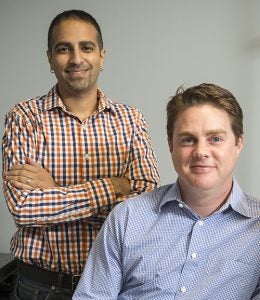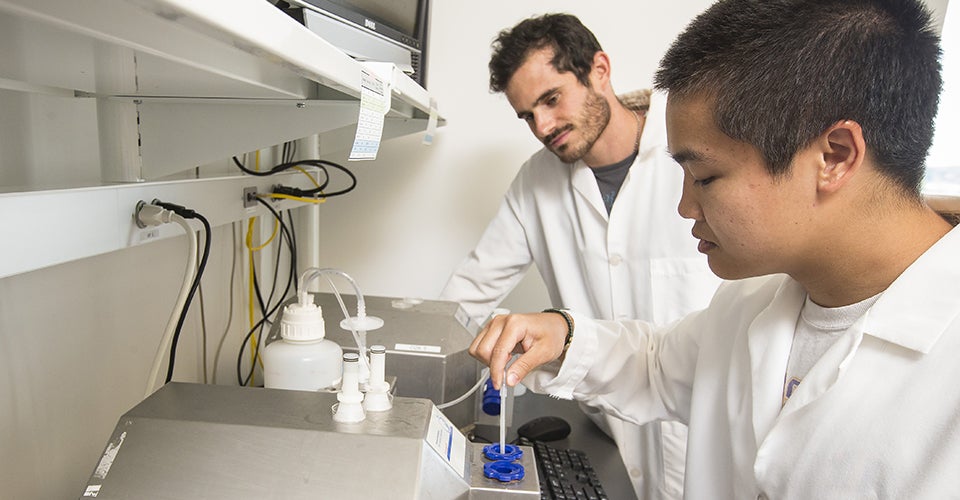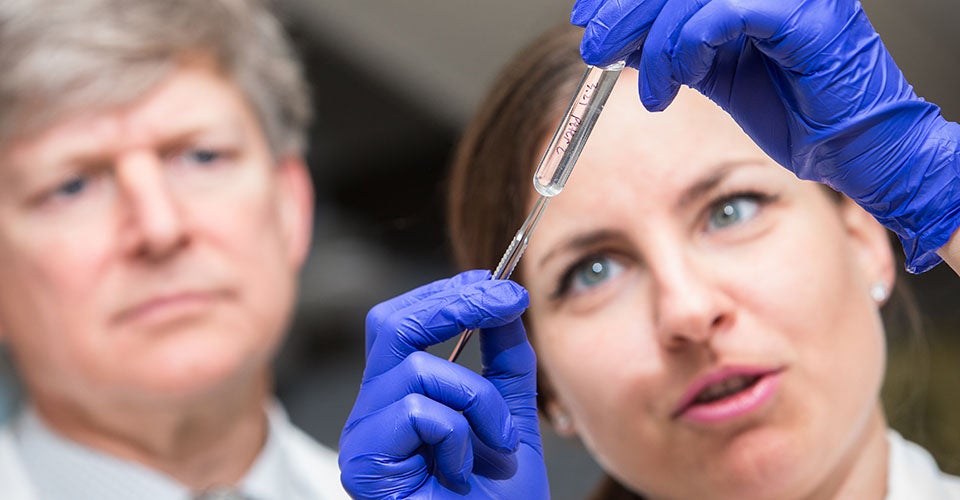RAISING THE GAME
ECU institute pushes boundaries in the science of metabolism
On the first three floors of the East Carolina Heart Institute at East Carolina University, medical specialists are immersed in providing world-renowned care to patients living with cardiovascular diseases. But on the fourth floor, scientists are hard at work seeking new strategies to prevent and treat those same diseases.
With every finding, the multidisciplinary group of researchers who comprise the East Carolina Diabetes and Obesity Institute (ECDOI) strengthen ECU’s global reputation as a leading authority in the niche of human metabolism – a major health concern worldwide, but especially in North Carolina.
“We don’t aim to be the biggest research center, but we do strive to be an extremely productive center, and to be recognized internationally for our excellence and expertise in research related to metabolic diseases,” says Dr. Darrell Neufer, the institute’s director since 2009.
Currently drawing $4 million annually in research funding, primarily from the National Institutes of Health, ECDOI is a hub for research on ECU’s health sciences campus.
Projects underway in ECDOI labs range in scope from cellular function to whole-body function. They delve into topics like energy balance, exercise, heart and vascular disease, cancer, immunology, nutrition, neuroscience and human development. Their principal investigators represent a variety of disciplines and departments including physiology, biochemistry, anatomy and kinesiology.
Neufer says multifaceted problems like diabetes and obesity require multidisciplinary solutions – an idea that’s reflected in governmental research funding streams.
“What draws the larger grants is research that pushes boundaries,” he says. “They’re awarded based on whether the science of a study stands to significantly advance the field, whether it’s likely to make a paradigm-shifting impact on health and disease research as a whole. But knowledge multiplies so quickly, it’s very difficult for any one individual to have the expertise needed to push those boundaries.”
Neufer says that’s why funding agencies like NIH value teams of scientists with diverse skill sets who can address a problem from different, yet complementary, angles. That’s also why ECDOI’s laboratory and office spaces were designed without walls.
Responding to an epidemic
The Metabolic Institute, as ECDOI was initially called, was established in 2004 by the UNC Board of Governors in response to the growing epidemic of diabetes and obesity in eastern North Carolina. But Neufer says a grant from the Golden LEAF Foundation in 2007 – and the move into their current physical space at ECHI a couple of years later – accelerated the institute’s growth and enabled researchers to truly begin pooling their resources, equipment and competencies.
The open, informal atmosphere that resulted feeds a culture of collaboration, generating a steady stream of good relationships and new ideas among the 80 or so faculty members, lab technicians, and undergraduate, graduate and postgraduate students who traverse the space daily.
Since 2009 researchers from the institute have drawn more than $16 million in funding to study topics like how targeting metabolism might more effectively treat certain types of cancers, or new drug approaches to help the heart muscle recover after a heart attack.
Private industry has also taken notice. So much so that physiologist Dr. David Brown, an expert in mitochondria – or the “engines of the cell,” as he refers to them – has started a contract research organization within ECDOI to help pharmaceutical companies test their drugs for effectiveness prior to animal or human testing.

Drs. Raz Shaikh and David Brown are among East Carolina researchers to draw more than $16 million in research funding and cutting-edge collaboration.
“Industry has been very impressed with our culture here,” he says. “We’ve earned a reputation not only for turning out data quickly, but for helping them interpret the data and advising them accordingly.”
The institute has also drawn top scientific talent in recent years from Harvard, Duke and Washington University in St. Louis. Biochemist and molecular biologist Dr. S. Raza Shaikh left Johns Hopkins University in 2008 to join the cutting-edge collaboration he was observing at East Carolina.
Shaikh relies heavily on social media to market ECDOI’s knowledge base and capabilities, and to establish contacts with fellow research institutions and private businesses across the state and nationwide. A specialist in understanding the function of membranes and lipids, he currently oversees a clinical trial to test the effectiveness of a specific fatty acid supplement in obesity and infection.
He finds great value in daily exposure to a variety of disciplines. “It broadens your skill set and pushes you out of your comfort zone, which makes you more competitive,” Shaikh says. “You learn from different ways of thinking. You start anticipating the questions other researchers will ask.”
Although he admits to being energized by the plethora of ideas birthed at ECDOI, Shaikh is quick to point out that not all are worth investing in.
“A big part of our mentality up here is business, not science,” he says. “We consider everything according to the potential NIH R01 [Research Project Grant]. We’re not just up here doing experiments for the fun of it, for the science rush.
“Due to the continued support of the state,” he adds, “we’ve been able to get big returns on our investments.”
Building on a legacy
East Carolina has a rich history of diabetes and obesity research dating back to the early eighties, when the founding chair of the Department of Surgery, Dr. Walter Pories, pioneered a type of weight-loss surgery called the “Greenville Gastric Bypass,” known not only for producing lasting weight loss, but also for reversing type 2 diabetes.
But ECDOI researchers have no intention of resting on their predecessors’ achievements. Next on their wish list: collaborating with other institutions in North Carolina and beyond in a clinical trial that could help determine, at the molecular level, exactly how physical activity benefits human health.
“We want to partner more with industry,” Neufer says. “We want to develop better translational research and community intervention research – research that informs care not only for our patient population, but for patients everywhere.”
“We still have plenty of room to grow,” he adds.
That’s what happens when you keep pushing the boundaries.

ECU graduate student Rick Alleman, left, and medical student Alvin Tsang work in the lab.
